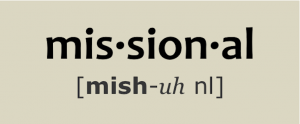This Sunday morning, in the adult catechism class at Oceanside URC, I begin a series on the emerging/-ent church movement. Catechism begins at 10:15 AM and worship begins at 11:00 AM (I’m also preaching the next two Sunday mornings and WSC Jon . . . Continue reading →
emergent church
Review: Reforming or Conforming
At The Voyages.
Lane Reviews "Reforming or Conforming"
At GB
Live 28 October 2008 2:20-3PM Pacific
On Issues Etc. We’ll be discussing Reforming or Conforming: Post-Conservative Evangelicals and the Emerging Church.
An Emergent "Translation" of the NT? Yikes!
Thanks to WHI producer extraordinaire Shane Rosenthal for giving us a heads up via email. Who says that the Emergent movement is harmless? If there were any doubts that it’s utterly wedded to religious subjectivism and to the worst strains of pietism, . . . Continue reading →
Peter, Do You Love Me?
Brilliant stuff from Nick at Restless and Reforming: Jesus: Simon, do you love me? Peter: Yes Lord, you know that I love you. Jesus: Fight injustice, homophobia, racism, you name it. Simon Peter, do you love me?
Surprise! Emergent Leader Embraces Pelagius
Tony Jones rejects Augustine, the North African church of the 4th century, the French Church of the 6th century, the entire medieval church, the Protestant Churches, and the Council of Trent (HT: Kevin DeYoung). Here’s one on which the confessional Protestants and . . . Continue reading →
Video: Emergent Panel Discussion Online
At Tangle (HT: Kevin DeYoung) The discussion features Kevin DeYoung, Scot McKnight, Tony Jones, Alex and Brett Harris.
McLaren Calls Out Machen's Warrior Children
The boomer evangelicals are converging. In a brief, undated blog post (HT: Jeff Locke) McLaren has seized the analysis of “Machen’s Warrior Chidren” offered by another boomer critic of Reformed confessionalists, John Frame, to characterize them as those
"The Shack" and the Atonement
Gary Johnson writes: The Scriptural support for the doctrine of penal substitution, as we will see, is overwhelming. Nonetheless, there is perhaps no other single doctrine that has elicited such harsh criticisms, even from those claiming to be Evangelical.
Brian's God
Brian McLaren has source of continual fascination at the HB. He’s also been so for Martin Downes at Against Heresies. Martin is raising questions about McLaren’s latest in which he demonstrates that concern that the Emergent Movement is just another form of . . . Continue reading →
On Being Truly Postmodern
An HB Classic
There is a good deal of talk in contemporary evangelicalism about the rise, nature, and effect of so-called “postmodernism,” a movement in architecture, literature, philosophy, and religion associated with a circle of French writers such as Michel Foucault and Jacques Derrida. In . . . Continue reading →
With Janet Mefferd On The Social Gospel
Here’s today’s episode of Janet Mefferd Today in which we discussed the “social gospel,” Walter Rauschenbusch, the emergent/emerging church movement and what it means that evangelicals seem to be heading back to this well for inspiration. We also talked about some alternative . . . Continue reading →
Why The Mission Needs The Marks
Doubtless the one of the most significant movements within evangelicalism at the moment is the “emergent” or “emerging churches” movement. The adjectives “emerging” and “emergent” designate different wings of the movement. Generally, the “emergent” wing is more radical and the “emerging” wing a little less radical. Just as frequently, however, in the contemporary rhetoric from both wings of the movement no distinction is made and this essay will speak of the “emerging movement” (hereafter, EM). Like their older evangelical brothers and sisters, the EM also rejects (at least elements of) fundamentalism and revivalism. In their place, they are constructing a cross-traditional, eclectic synthesis. Continue reading →
On Being Truly Postmodern
There is a good deal of talk in contemporary evangelicalism about the rise, nature, and effect of so-called postmodernism, a movement in architecture, literature, philosophy, and religion associated with a circle of French writers such as Michel Foucault and Jacques Derrida. In . . . Continue reading →


